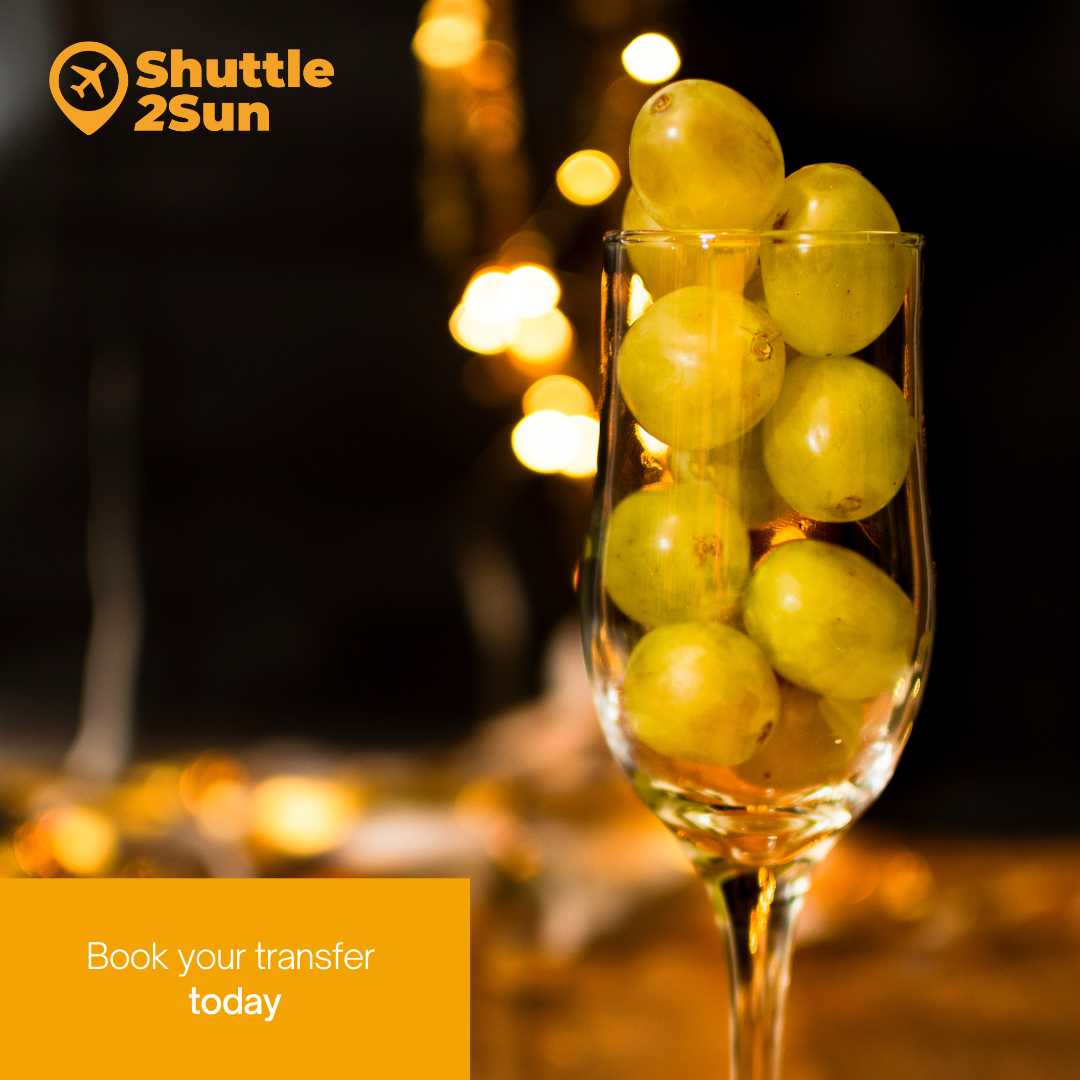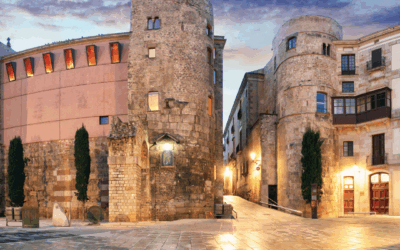Celebrating the New Year’s Eve is a celebration that is lived with great excitement and hope, becoming an event that is already part of our annual calendar. Whether accompanied by family or friends, it is a celebration that has become consolidated as a ritual in our lives, allowing us to share experiences and unique moments with our loved ones.
But what’s behind New Year’s Eve? In this article we are going to explain the origin of the chimes and the tradition of eating 12 grapes, in the case of Spain. If you don’t want to miss this magnificent event on the Catalan coast, we recommend that you travel to Barcelona or Costa Dorada during this time of year. With Shuttle2Sun‘s low-cost and sustainable private transfer services, you can reach your preferred destination from Barcelona airport, Barcelona port or Camp de Tarragona AVE train station.
Why do people eat grapes?
The days surrounding Christmas are full of symbolism and tradition. In every corner of the world, different rituals are carried out to wish a prosperous new year. For example, in the case of Spain, the most deeply rooted custom is to eat 12 grapes in the last 12 seconds of the year, before the clock at Puerta del Sol in Madrid strikes midnight.
What is the origin of this habit? Initially, grapes were a luxury food and were only eaten by the wealthiest classes in Madrid to celebrate the New Year, who, on New Year’s Eve, toasted with champagne and tasted this fruit. Grapes have always been a symbol of prosperity and good luck.
At the beginning of the 20th century, there was a very good grape harvest in Levante area, in Vinalopó valley in Alicante, which produced a huge surplus. Faced with this situation, the producers decided to sell them as ‘lucky grapes‘, in packs of twelve, one for each month of the year, to be consumed with the last 12 chimes. In this way, they ended up becoming a product in great demand by society, becoming part of the Spanish tradition to celebrate this magical night.
However, there is another theory that suggests that, at the end of the 19th century, the humble classes of the Madrid capital decided to stand in front of the clock of Puerta del Sol to eat the grapes, as a protest and parody of the customs of the bourgeoisie.

12 chimes
In the past, as there were no clocks in the houses, families used to go to the squares of the town halls in their villages to look at the clock on the façade and count the last seconds before midnight. Although one of the most emblematic places in Spain is Puerta del Sol in Madrid, this tradition is celebrated in every corner of the country, for example in Barcelona city.
In Spain, the number 12 is an essential part of the New Year’s Eve celebration: 12 grapes, 12 chimes and 12 wishes. This number is chosen for the 12 months of the year. Each grape we consume is linked to a wish for each of the months of the coming year, making a total of 12.
The challenge comes when we have to eat the 12 grapes in the last 12 seconds, as, on many occasions, it can be complicated, due to the speed of the chimes. It should also be borne in mind that, before the 12 chimes, the four quarters sound, which anticipate the beginning of the last seconds of the current year. The moments before the chimes are full of excitement, nervousness and hope for the new year to come.
Nowadays, there are several alternatives for people who do not like grapes, such as, for example, eating nuts or sweets at each ringing of the bell.
If you want to celebrate this New Year’s Eve in Barcelona or Costa Dorada, remember that you have at your disposal the Shuttle2Sun private transfer services, low-cost and sustainable, from Barcelona airport, Barcelona port or Camp de Tarragona AVE train station.

The chimes, with family and friends
You can follow the chimes from anywhere in Spain, as they are broadcast on television, radio and internet, on numerous channels. The first time it was possible to follow it live was in 1962, on Radio Televisión Española. Since then, it has become a tradition to watch the chimes from anywhere in Spain.
Many cities organise events to celebrate New Year’s Eve, and many people go to the squares of their towns to count down to welcome in the new year. In Barcelona, for example, you can enjoy an incredible show next to the Magic Fountain of Montjuïc, in Plaça de Carles Buïgas. Thousands of people gather here to celebrate one of the most magical nights of the year.
Or, if you prefer to celebrate in a more intimate way, with your family and friends, you can go for dinner at any restaurant in the area, as they have special New Year’s Eve menus; or stay at home, all seated by the TV, while you follow the chimes as many Spanish families do.
You can discover all the plans we have for you for New Year’s Eve in Barcelona and Costa Dorada in our publication “What to do for New Year’s Eve”.
Other New Year’s Eve traditions in Spain
Spain not only has the tradition of the 12 grapes, but also has other, lesser-known customs.
Many people choose to wear new red underwear to wish for love in the coming months, or to dip their wedding ring in the toast glass to ask for stability in their relationship.
There are also those who want to start the year on the right foot and, symbolically, once the chimes have finished, step on the ground with this foot; and others who write down their resolutions for the new year.
In short, there are many rites that motivate us to wish a happy new year and to celebrate the beginning of this one, accompanied by our loved ones. Remember that Shuttle2Sun offers its private transfer services, low-cost and sustainable, so you can reach your destination from Barcelona airport, Barcelona port or Camp de Tarragona AVE train station.



